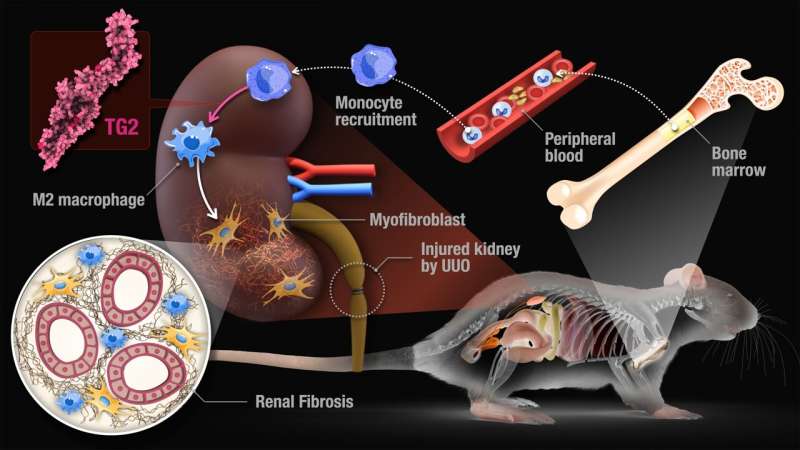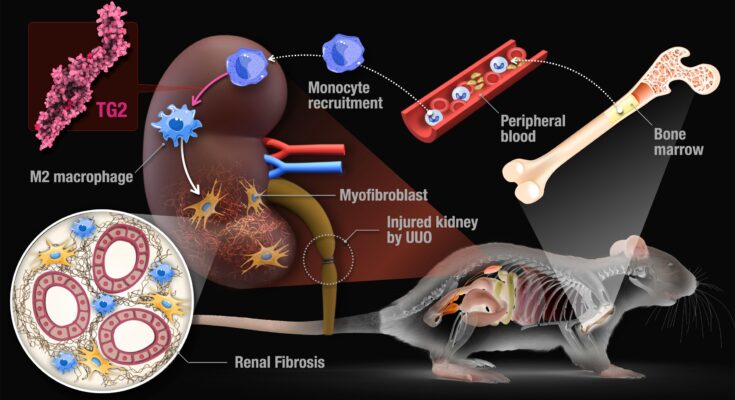
Researchers at Nagoya University in Japan have identified two enzymes that are involved in macrophage polarization, one of the key factors affecting fibrosis. The group’s findings, reported in Cell Death & Disease, suggest a potential treatment for human patients.
Kidney fibrosis is a dangerous inflammatory disease that causes the organs to stiffen and lose normal function. The disease is linked to a process called macrophage polarization. Polarization is the process by which macrophages, the white blood cells that help the body fight infection and repair tissue, are changed into two types as a response to changes in the microenvironment of the cell: the M1 type, which causes inflammation, and the M2 type, which has anti-inflammatory and tissue repair properties.
Because macrophage polarization is tightly controlled and involves multiple signaling pathways and regulatory networks, imbalances in this process are common in many inflammatory diseases. In patients with kidney fibrosis, there is an imbalance between M1 and M2 macrophages. In this situation, M2 macrophages, which normally suppress inflammation, proliferate excessively and secrete factors that promote fibrosis.
Although these imbalances may be therapeutic targets, this is hampered by the fact that the mechanism of macrophage polarization involved in kidney fibrosis is still poorly understood. Furthermore, the molecular mechanisms of macrophage polarization have little in common between mice and humans, making it difficult to translate research results obtained in mice to human diseases.
A Nagoya University research group led by Assistant Professor Hideki Tatsukawa, graduate student Yoshiki Shinoda, and Professor Hitomi Kiyotaka of the Graduate School of Pharmaceutical Sciences, in collaboration with Professor Takayoshi Suganami and Lecturer Miyako Tanaka of the Research Institute of Environmental Medicine, has identified an enzyme associated with kidney fibrosis in both mice and human models called protein cross-linking enzyme transglutaminase (TG2). Their discovery opens the possibility of translating findings in mouse models into therapies for human patients.
As its name suggests, TG2 is involved in the cross-linking of amino acid residues in proteins. In fibrosis models, TG2 induces another enzyme, arachidonic acid oxidase (ALOX15), through the cross-linking process. Since previous studies have reported that ALOX15 is involved in M2 macrophage induction, the group’s findings suggest that TG2 activity exacerbates kidney fibrosis by polarizing M2 macrophages using ALOX15.
“Macrophage polarization, which promotes fibrosis through cross-linking enzymes, has a similar induction mechanism in both humans and mice,” Tatsukawa said. “By targeting the regulation of macrophage function, we hope to develop treatments for various diseases caused by an imbalance between the promotion and suppression of inflammation, such as fibrosis, cancer, and atherosclerosis.”
Their research also suggests that drugs developed for celiac disease, that inhibit TG2, could be repurposed to treat fibrosis. “TG2 also converts wheat gluten into gliadin, which is known to cause gluten sensitivity (celiac disease),” Tatsukawa said. “A TG2 inhibitor has been developed for the treatment of this celiac disease and is currently in clinical trials. We believe that this inhibitor could be used in the treatment of fibrosis because researchers, including our group, have found that the administration of TG2 inhibitors suppresses the pathogenesis of fibrosis models in the kidney, liver, and lung.”
More information:
Yoshiki Shinoda et al, Tissue transglutaminase exacerbates renal fibrosis via alternative activation of monocyte-derived macrophages, Cell Death & Disease (2023). DOI: 10.1038/s41419-023-05622-5
Citation:
Researchers identify two enzymes involved in macrophage polarization in kidney fibrosis (2023, March 23)
retrieved 23 March 2023
from https://medicalxpress.com/news/2023-03-enzymes-involved-macrophage-polarization-kidney.html
This document is subject to copyright. Apart from any fair dealing for the purpose of private study or research, no
part may be reproduced without the written permission. The content is provided for information purposes only.
Source link




